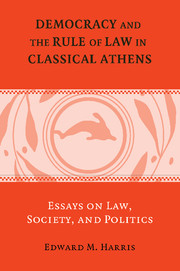Book contents
- Frontmatter
- Contents
- PREFACE
- ACKNOWLEDGMENTS
- ABBREVIATIONS
- INTRODUCTION
- I LAW AND CONSTITUTIONAL HISTORY
- II LAW AND ECONOMY
- III LAW AND THE FAMILY
- 1 Did the Athenians Regard Seduction as a Worse Crime than Rape?
- 2 Did Rape Exist in Classical Athens? Further Reflections on the Laws about Sexual Violence
- 3A Women and Lending in Athenian Society: A Horos Re-Examined
- 3B Notes on a Horos from the Athenian Agora
- 4 The Date of Apollodorus' Speech against Timotheus and Its Implications for Athenian History and Legal Procedure
- 5 A Note on Adoption and Deme Registration
- IV ASPECTS OF PROCEDURE
- V ENVOI
- BIBLIOGRAPHY
- INDEX LOCORUM
- SUBJECT INDEX
4 - The Date of Apollodorus' Speech against Timotheus and Its Implications for Athenian History and Legal Procedure
Published online by Cambridge University Press: 25 February 2010
- Frontmatter
- Contents
- PREFACE
- ACKNOWLEDGMENTS
- ABBREVIATIONS
- INTRODUCTION
- I LAW AND CONSTITUTIONAL HISTORY
- II LAW AND ECONOMY
- III LAW AND THE FAMILY
- 1 Did the Athenians Regard Seduction as a Worse Crime than Rape?
- 2 Did Rape Exist in Classical Athens? Further Reflections on the Laws about Sexual Violence
- 3A Women and Lending in Athenian Society: A Horos Re-Examined
- 3B Notes on a Horos from the Athenian Agora
- 4 The Date of Apollodorus' Speech against Timotheus and Its Implications for Athenian History and Legal Procedure
- 5 A Note on Adoption and Deme Registration
- IV ASPECTS OF PROCEDURE
- V ENVOI
- BIBLIOGRAPHY
- INDEX LOCORUM
- SUBJECT INDEX
Summary
the date of apollodorus' speech against the athenian general timotheus ([Dem.] 49) has not been a matter of dispute since Arnold Schaefer over a century ago assigned it to the archonship of Molon (362/61). His dating of the speech has been followed by almost all scholars and appears in several standard works of reference. After such a long period of virtually unquestioned acceptance, the time has come to challenge this dating, which, as we will soon see, rests on an assumption for which there is no evidence at all.
We need to begin by examining Schaefer's method of determining the terminus post quem for the delivery of the speech. Schaefer noted that Pasicles, the younger brother of Apollodorus, gave testimony as a witness at the trial of Timotheus ([Dem.] 49.42). On the grounds that Pasicles could not have appeared as a witness until he had reached the age of majority, Schaefer argued that the speech could not have been delivered before the archonship of Molon (362/61), the year in which Pasicles turned eighteen.
Whereas there can be no question that a youth in Athens attained the age of majority on reaching his eighteenth birthday, there is no evidence that would allow us to say whether or not those younger than eighteen were forbidden to testify in Athenian courts. The only text which deals with the issue is from Plato's Laws (937a–b), where we find a discussion about laws relating to evidence at trials and a recommendation that only in homicide cases should children and slaves be allowed to give testimony.
- Type
- Chapter
- Information
- Democracy and the Rule of Law in Classical AthensEssays on Law, Society, and Politics, pp. 355 - 364Publisher: Cambridge University PressPrint publication year: 2006



